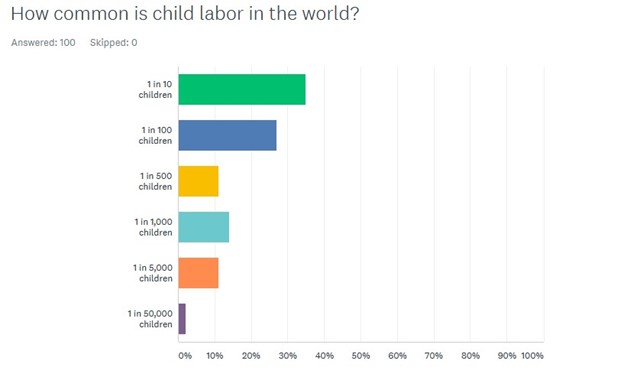 By Child Labor Coalition intern Ellie Murphy
By Child Labor Coalition intern Ellie Murphy
Americans eat a lot of bananas. The U.S. is the world’s biggest importer of bananas, eating between 28 and 30 bananas per person per year. Worldwide, bananas are the most popular fruit with 100 billion consumed annually. The fruit is nutritious and cheap. Prices generally fluctuate between 30 cents and $1.00 per banana. It’s a great deal for the consumer, but someone is paying a heavy price to produce bananas: exploited farmworkers, including many children.
Stagnating banana prices have put the squeeze on farmers, leading some planters to hire the cheapest workers—children. The work is hard, often dangerous, and not fit for children. Yet they toil in the fields to help their impoverished families.
Countries that use child labor to produce bananas include Ecuador, Belize, Brazil, Nicaragua, and the Philippines, according to the U.S. Department of Labor’s (USDOL) List of Goods Produced by Child Labor or Forced Labor.
Poverty is the main driver of child labor, but children in the developing world face barriers to accessing education that can push them to farm work. Besides the cost of school, uniforms, and books, there are also some countries that don’t have enough schools, classrooms, or teachers. And transportation problems can impact children’s ability to attend school.
Child labor in the banana sector poses significant challenges to children’s health and overall well-being. Child workers employed at these plantations are often forced to handle sharp tools like machetes, carry heavy loads, and face exposure to agrochemicals like pesticides and fungicides without protective clothing or gear. Dizziness, nausea, and negative long-term health conditions can result in child workers, and because child workers often live on banana plantations, escaping these health hazards is nearly impossible.
Let’s take a closer look at Ecuador, the world’s top exporter of bananas.
A Human Rights Watch (HRW) report released in April 2002 found widespread labor and human rights abuses on Ecuadorian banana plantations. Children as young as eight were found performing hazardous work. “The use of harmful child labor is widespread in Ecuador’s banana sector,” concluded HRW. Report authors interviewed 45 child banana workers and found that 41 began working between eight and 13 with most starting at age 10 or 11. “Their average workday lasted twelve hours, and fewer than 40 percent of the children were still in school by the time they turned fourteen,” noted HRW. According to USDOL, almost half of indigenous children in rural areas do not attend school, “which can make them more vulnerable to child labor.
“In the course of their work, [child banana workers] were exposed to toxic pesticides, used sharp knives and machetes, hauled heavy loads of bananas, drank unsanitary water, and some were sexually harassed,” noted HRW.
Roughly 90 percent of the children HRW interviewed reported that they “continued working while toxic fungicides were sprayed from airplanes flying overhead. In an attempt to avoid harmful chemicals, children interviewed about their experience stated that they used various methods to avoid toxic chemicals: “hiding under banana leaves, bowing their heads, covering their faces with their shirts, covering their noses and mouths with their hands, and placing banana cartons on their heads.”
About one in 20 Ecuadorian children in the 5-14 age group work—and four in five of these child workers toil on farms, according to data from USDOL released in its 2019 Findings on the Worst Forms of Child Labor (2019) report.
Clearly, child labor laws in Ecuador are not being adequately enforced. Alarmingly, according to the USDOL, funding for Ecuador’s labor inspectorate fell dramatically from $1.5 million in 2017 to $265,398 in 2018. During that time the number of inspectors increased from 150 to 249. There is no explanation provided for these conflicting numbers but USDOL did note there were fiscal pressures on the Ecuadorian government.
The 2002 HRW report cited many causes of child labor, including discrimination against unionized adult workers who earn higher wages. As a result, many workers who unionize are fired and replaced with children who earn around $3.50 per day, 60 percent of the minimum wage for banana farmers. “Ecuadorian law fails to protect effectively the right to freedom of association, and employers take advantage of the weak law and even weaker enforcement to impede worker organizing,” noted HRW.
Since the 2002 HRW report, Ecuador has raised the minimum age of employment to 15, banned children from hazardous work, and raised fines for employers hiring children.
In its 2019 child labor Findings report, USDOL noted that “in 2018, Ecuador made a significant advancement in efforts to eliminate the worst forms of child labor.” One change involved better protecting unionized employees against discrimination so that children are not targeted for cheap labor. Ecuador has also created more social programs for children susceptible to child labor, including the “Lifetime Plan” that provides conditional cash transfers to vulnerable children from birth.
Despite the positive ranking for Ecuador, child labor in the banana sector continues to be prevalent in Ecuador. Poverty and limited law enforcement make child labor an unfortunate reality for families.
Banana exporting companies often fail to address adequately child labor and hazardous working conditions in their supply chains. The big players –Dole, Del Monte, and Chiquita Fyffes—need to do more if we are to end child labor in banana production. Dole claims to prohibit child labor stating that “[it prohibits] any people younger than 18 from being hired or employed in any form.” Yet, child labor in the sector flourishes in at least five of the major exporting countries, according to USDOL.
In its Findings report, USDOL makes a number of recommendations to help reduce child labor in Ecuador, including a call for a new national child labor survey, added funding to hire more labor inspectors, and social programs in rural farm areas and informal sectors. USDOL also suggests “removing school-related fees, increasing classroom space, and providing adequate transportation.” These modifications will specifically help children living in rural areas such as migrant children and indigenous children stay in school.
Concerted efforts by the Ecuadorian government and multinational banana exporters are needed if child labor is to be reduced.
Consumers have a part to play in the solution as well. The Food Empowerment Project advises consumers to buy bananas produced with less exploitation. They recommend buying from Equal Exchange. Bananas from small farmer-owned cooperatives are available in some parts of the United States. Look for bananas from Coliman, Earth University, and Organics Unlimited/Grow. “If your grocery stores do not carry these brands of bananas, we encourage you to ask them to,” says the Food Empowerment Project.
Consumers should make their voices heard: the sweetest banana is a child-labor-free banana.
Ellie Murphy is a rising junior at Tufts University, majoring in International Relations and Sociology.





 By Nailah John, Linda Golodner Food Safety and Nutrition Fellow
By Nailah John, Linda Golodner Food Safety and Nutrition Fellow
 By Child Labor Coalition intern Ellie Murphy
By Child Labor Coalition intern Ellie Murphy










